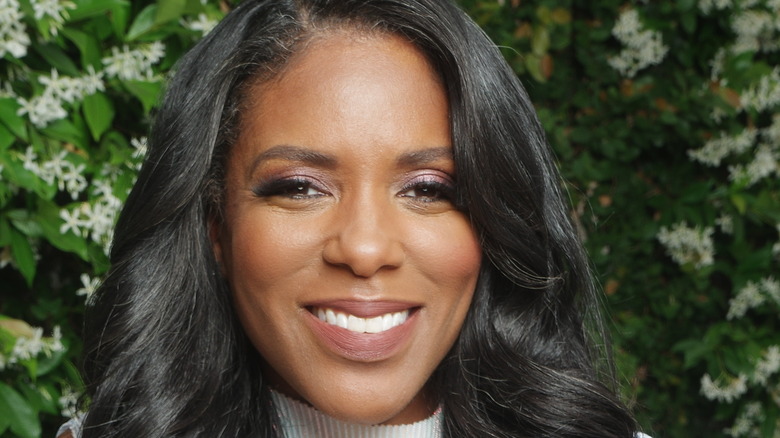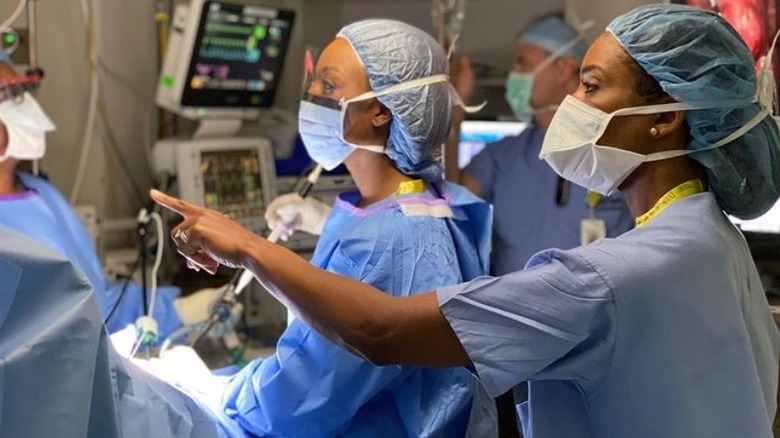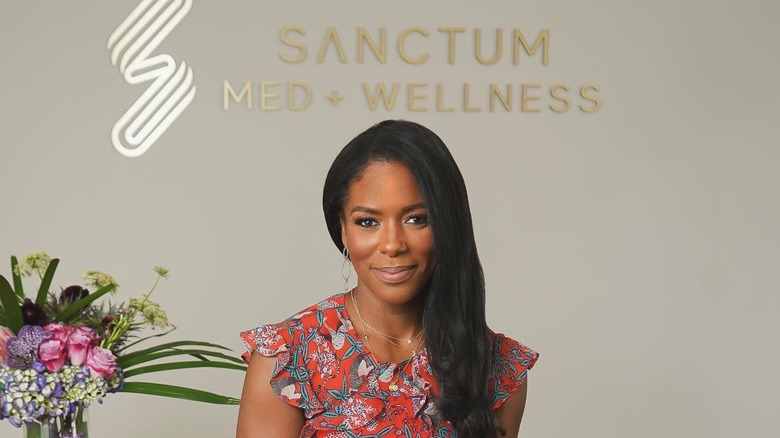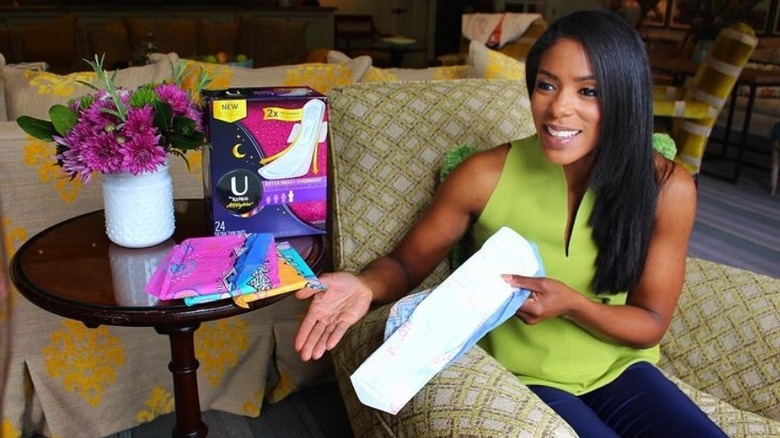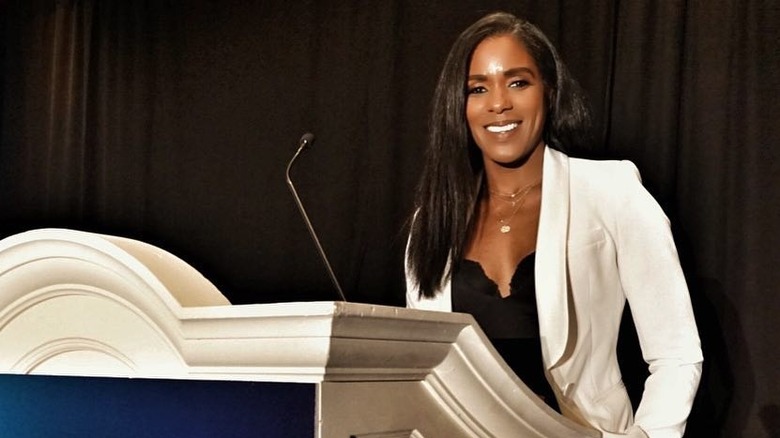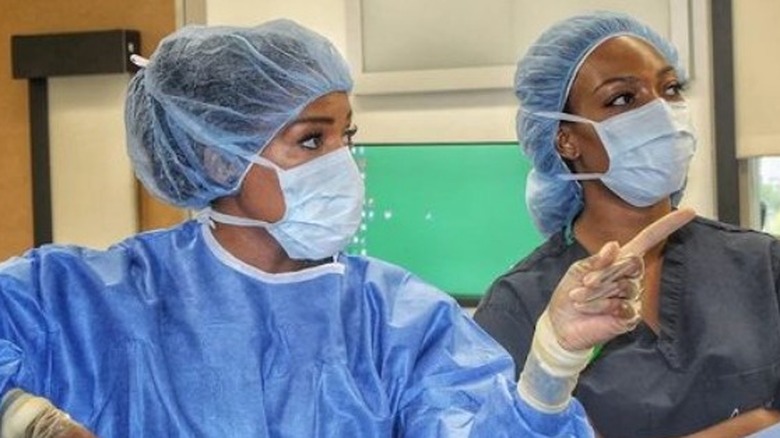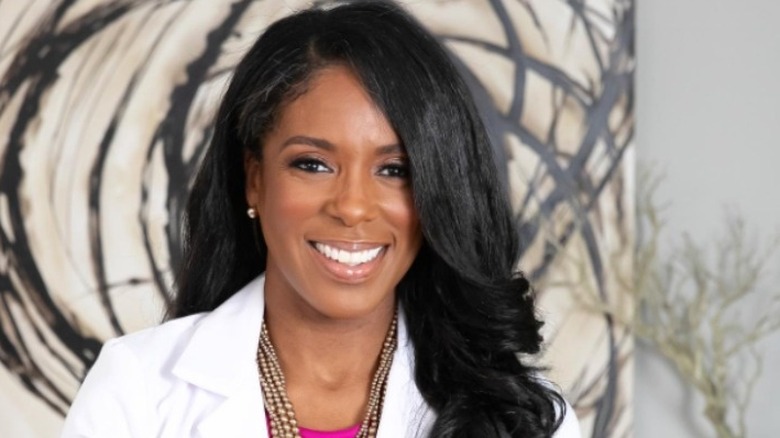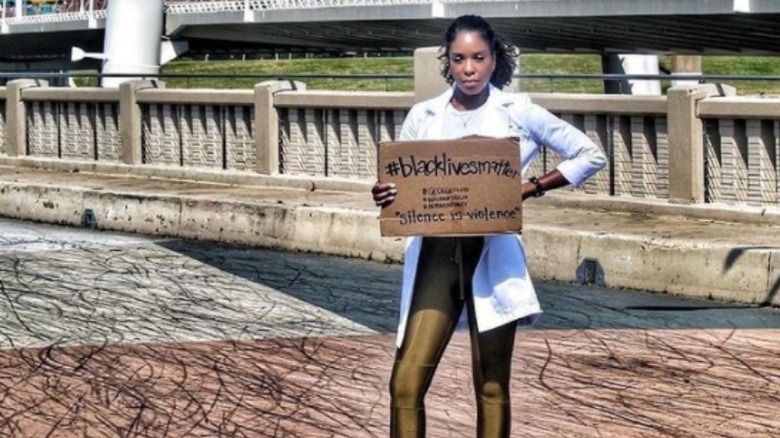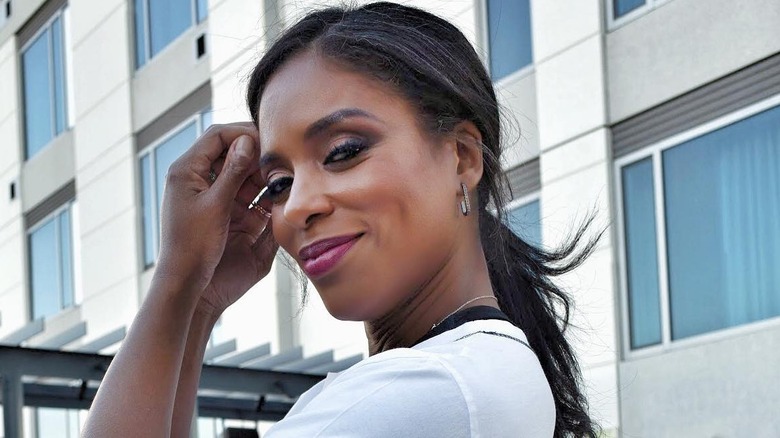Dr. Jessica Shepherd On Conventional & Holistic Approaches To Women's Health – Exclusive Interview
Dr. Jessica Shepherd, an OB-GYN and women's health expert, has made it her primary mission to help women take control of their health and their bodies. Dr. Shepherd is passionate about removing the stigma associated with discussing women's health. At her facility, Sanctum Med and Wellness, she fosters a safe space for women to discuss their bodies openly, frankly, and without shame.
She's also passionate about helping her patients find the treatments and lifestyle changes that make them feel their best, and she doesn't limit their options by only offering traditional, Western medicine treatments. Dr. Shepherd is all for a holistic approach to women's health and pairs treatments like acupuncture, yoga, meditation, and mindfulness with traditional approaches.
In an exclusive interview with Health Digest, Dr. Shepherd revealed why open conversations about women's health are essential, how women can use holistic treatments to manage their menstrual cycles, and ways the health care system needs to do better for Black women.
Becoming an advocate for women's health
Why did you choose obstetrics, gynecology, and women's health as your specialty?
As a physician, you want to be able to serve a population in a way that you feel passionate about. And one of the things I felt really passionate about was women's health – in and outside of pregnancy. But through the lifespan of a woman, there's so much complexity to it. And the ability to impact women in that way was really important to me.
As you just touched on, it's your passion to talk about women's health and especially to remove the discomfort around talking about women's health issues. ... Was there something that got you to latch on to the need to remove this stigma about talking about women's health?
Yeah. I think if you look even into aspects of research, there's a lot of different research or disease states, rather, that don't really account for women in that. If you think of product innovation, there's a lot that does not go towards women's health. And so I really wanted to be an advocate for women through being a physician and a health care expert, and allowing them to have the space to feel comfortable.
For example, [obstetrics and gynecology] was a male-dominated field. [It's] not like there's a problem with having a male OB-GYN, but they were the overwhelming majority of OB-GYNs for a very long time. And so when it comes to women's health — whether it's reproductive health or just even menstrual care health — there's a lot of shame and stigma that comes around that. So compounded with [the fact that] the person that you want to talk to about your intimate health issues is a male, it sometimes lends to increasing that gap in awareness and education and advocacy.
In your opinion, how do you think we can create a society that's more comfortable talking about women's health?
I think the uncomfortable conversations that have come up or that have become an issue over decades now, really, the more we talk about it — the more uncomfortable topics that we talk about — will start to become comfortable. And then I think we also need to bring men into the conversation. So again, it doesn't become this one-sided conversation of what's going on in women's world and women's health, and that they're aware, and that they should be educated on the things that impact women.
Holistic approaches to women's health
Can you tell us a little more about Sanctum Med Wellness and what motivated you to open that facility?
After practicing for, what, 15 years, I really felt that there was a gap in the conversation. There's so much to offer as a physician as far as medications, or what surgery would be needed, or just kind of dealing with the actual health issue as they came to me. But there was a part of the lifestyle — the emotional health, the sexual health — outside of what you would think of with the confines of a traditional medicine interaction with a doctor and a patient. I know that there's so much behind lifestyle change, holistic options, [and] alternative forms of impacting our health that are not able sometimes to be touched in a traditional setting.
I really wanted to bring Eastern philosophy and alternative forms of holistic health into my practice. And the best way to do that is to expose them to it as they're in my space. So we really worked hard at bringing in a yoga studio, a meditation lounge, a nutritionist, [and] an acupuncturist who's an Eastern medicine doctor.
All of us together are all on the same team in order to help women impact their health to a broader level outside of just "here's a medication." It's "what things can I take daily?" or "how can I meditate to help my health, or my heart rate or my mental health and emotional health?" So all of those are incorporated into the practice.
Why [does] this approach, this holistic approach to both mind and body, makes the most sense for you and your patients?
It makes so much more of a difference for my patient's outcomes. So, long-term outcomes: When we look at health, we look at being outside of an illness state, but in order to really accomplish long-term outcomes that reflect that, it has to be a lifestyle change. So me being their healthcare provider, I have to find a way to implement that into their routines, their habits, so that whatever I prescribe for them, or whenever they have a condition that really does need medical attention, I'm still able to infuse a holistic lifestyle that they could continue outside of the exam room. And then together, as a patient and a physician, we're really able to work together to really improve longevity and quality of life.
Holistic treatments for PMS
One of the things that you've been working on is PMS. Can you tell us a little bit about your research into using a more holistic approach to PMS?
Yeah. Working with O Positiv on their medical advisory board has really allowed me to, again, use these innovative ways and holistic ways of working with conditions that women will have. So PMS is something that you can't take away. It's just something that will come with changes in hormones and fluid shifts. And so that's all very important to how we're able to help women, again, improve their lifestyle in a way that's not always in a medical fashion.
O Positiv ... really finds ways to empower women, and being really intentional with their product line so that it's ... research based, because there's a lot of products that are out there that are not research based. And to me, that's important. That's where the Western medicine comes into being impactful. Does it have research behind it? Is it trusted?
And so I find that working with O Positiv has allowed me to, again, incorporate those alternative and complementary ways of impacting our lifestyle. And through working with them and knowing the medical background of PMS, I find it's a beautiful way for me to give patients one physiologic reason why they are having this issue with premenstrual syndrome, but here are some other ways that you can offset it. And yes, I think that, for some women, they do need forms of medication or hormonal support with birth control pills or other medications. But I also believe that there's also a beautiful way to marry remedies for them that are not traditionally medicines.
When I have patients who come in with PMS and maybe they've failed birth control pills, or maybe they're just like, "I don't want to take that. What are some other ways?" I am always ready to recommend the O Positiv FLO [vitamins]. ... A lot of patients are very hesitant to take things that are ... they don't want to swallow pills or they don't want to take a shot. And so in a gummy form, this is a beautiful way as a vitamin to really have some of their symptoms alleviated without having to take medication. And then also lifestyle factors as well, like giving them really good tools and tips of things that they can eat prior to, or not eat prior to, that portion in their cycle. Or exercise as finding a way to decrease the oxidative stress that's going on in their body. And that's going to help with the bloating too, and then also mood swings.
Tips for managing menstrual cycles
What are some tips or practices that you usually give women who are looking for a more holistic approach to managing their menstrual cycles?
Tips that I give are knowing your body. I think that's first and foremost. Really paying attention to how each individual body regulates itself. And if you start to pay attention to how your body operates, many times you'll find that you can be in tune with it, so you kind of know when things are going to happen, know what impacts it in a good way or not in a great way. And then kind of working through that to minimize things that don't work well for your body or serve you well and then focusing on things that can improve just that period that you may be going through. Period, not meaning the period, but a period of PMS, et cetera.
So tips that I give are one, paying attention to your body – body awareness and then also really finding ways to boost the things that we know through research in a holistic lifestyle and nutritional value that's going to help you. And that usually will allow people to really take a step back and look at, "Okay, well, what am I doing now? And how can I make that better?" And that's really what the journey should be. "How can I help myself best?" That requires taking a step back sometimes to see what you're doing, and then seeing how you can improve it, by either taking things out or adding things into your daily regimen.
Warning signs for abnormal periods
Part of your specialty is in gynecological conditions like endometriosis, adenomyosis, PCOS (polycystic ovarian syndrome). One of the things that we commonly see in the health care space is that women don't get diagnosed with those diseases for several years, because they don't even recognize that their periods are abnormal. So can you tell us a little bit about what's normal and what's not normal for a menstrual cycle?
There are some people from the time that they've started to have periods that may have some irregularities to it and so that's always good to note. In your report to your physician, say, "This is my normal" and it may be slightly irregular. But when we think of, like, a true regular cycle, you want it to be every 28 to 30 days, plus or minus a day. And it should last anywhere from five to seven days. But you may have some that are plus or minus one from that four to eight, or even four to nine days. And then when we think of the flow, you would think that the flow would usually start heavier in your first through third day, and then start to taper off.
Now the big feature of a period that I think is where we're starting to see some of these diagnoses being missed is pain. So during your cycle, it is an inflammatory phase. That's part of the normal physiology of a period. And your body releases prostaglandins in order for this pathway to do what it's doing. And that's the beautiful part. I always try to maximize the beautiful part of what a body can do. Now, what we will see is there will be some discomfort for some during a cycle. And that, again, is due to the physiologic aspect of what's going on.
Now, where we start to see kind of mismanagement or misdiagnosis, or time duration of other conditions such as, say, endometriosis – and this is endometriosis awareness month — is that ... pain is subjective. I can't experience how you're experiencing pain and vice versa. And so because it's subjective, that's where sometimes the mark is missed because someone's saying "I'm in severe pain" and us not being able to really grade that or really know what severe means is sometimes we miss the mark on what "severe" is. And so I think — and ultimately physicians really are here to help women, or anyone, people in general — what we try to do is make sure that we're not giving everyone the top-notch pain medication.
So we do use a step approach to ... try and address your pain. I think we need to do better in our conversation with patients on monitoring that pain and figuring out what that person's pain scale is so we can really identify what severe means for that particular person. These are some of the things that we're starting to see in management of endometriosis, painful periods, and pelvic pain, which we've come a long way.
Even from when I started my career, 'til now, I've seen changes in how we actually approach pain, and how we actually address it with women in a way that they feel heard. And then going from there to make sure, yes, your pain is being addressed in a way that either needs to be looked at differently or that we're hitting the mark and we're getting your pain addressed in a way that is good for both parties. And the last thing I would say is society, society for so long has really pushed off pain from a pelvic perspective because it's a women's health issue. And anything below the belt was so taboo that for so long women would have pain and then not say anything about it. So I think we're moving too, in a way, that women will feel open to staying, "I feel pain. And it's severe. And I need help," and not feeling shame or embarrassment about disclosing that information.
Advocating for yourself in the exam room
We see a lot in communities of people who have these gynecological illnesses talking about their pain or their symptoms that they consider to be abnormal not being taken seriously. And as you said, that is improving so much in the field. But for those women who are still experiencing that, how can they advocate for themselves?
The relationship they have with their doctor [is important]. Maybe they're getting to a point of being able to express confidently the issues that they're having [or] feel that the conversation's not being met the way that they would want it to.
Because there's always responsibility that, as healthcare providers, we can't just do everything that a patient says. It's more so what's the reception of the information? And if they feel that's not being received well, to change providers. So that's another way of figuring out what is the best way ... to be heard — to find a person who's going to be on the journey with you. And then I would say the other thing is finding a longer list, I guess you could say, of alternatives to address pain issues.
I think that there are so many modalities that haven't been looked at or [that] people may not be aware of it. So for example, when we think of FLO gummies that can help alleviate some of that discomfort that you may feel. Or even holistic ways, like actually exercising prior to your period's start, or during the PMS period, can actually alleviate the prostaglandin release and the severity of it. Or even things like we offer at Sanctum Med and Wellness, like acupuncture.
Acupuncture is very well researched and has been around obviously for a very long time to help pain. So I think we're getting to a point in our lives where we're able to really put it all together in one composite rather than it being siloed as information.
The Black maternal mortality crisis
To shift gears a little bit, one of the other things that you're passionate about is the Black maternal health crisis in the United States. Can you tell us a little more about that issue?
The Black maternal mortality, the maternal mortality crisis, really is a reflection of our society and where we need to do better. Because we live in a country that has the best health care system, and organization, and hospitals, and research in the world, but yet we're still seeing numbers that reflect we are missing the mark a lot.
And so, to be quite frank, a lot of that comes down to the racism that we see in health care. Even last year, the American Medical Association listed racism as a public health issue. And [we're] able to call it to name, and really just say this is the fundamental issue. And we know the statistics, the maternal mortality statistics: [A Black woman is] three to five times more likely [to die] during pregnancy or in the postpartum phase. The numbers are there, so the numbers are not lying.
What we really need to focus on is the community [is] how we can foster better communication resources. We know that the access to care is completely different as far as in those communities and Black and Brown communities. And then also the coverage of care. So what are the types of care that these women are being one, subjected to, or being allowed access to, has a big indication on why we're seeing these numbers.
And now we've even gotten to the part in research where we take away education levels or socioeconomic status, and the numbers still reflect that there are more deaths in Black and Brown communities. For a long time, people thought it was just due to socioeconomic status, or where you live, or what communities you live in. And obviously, you're going to see more numbers in lower socioeconomic communities. But at the end of the day, you're still seeing the reflection of an increased risk for Black women — no matter where they live, what status they are — having deaths. So that's a big issue.
Changing the system
What are a few things that you think need to change in the health care system to address it?
I think from a leadership perspective, there needs to be [a] change in representation in who is at the head of these tables — because that's where the actual laws or legislation is made. And if there's no representation from that level, then you truly won't have a diverse, trickle-down effect. ... So representation is one.
And then the other thing is communication. Communication is one of the biggest factors we see in any issue, like even marriage, in why you have poor outcomes. And so learning communication — even from a patient perspective, but also from a physician perspective, on how to communicate with people who may not look like you, have experiences like you — [is important].
And then that goes to [addressing] our biases as well, that we don't think we have but are really there. That really takes an individual internal look at "what am I doing to contribute to this issue and what can I do to offset that issue?"
To branch off of that a little bit, what other barriers to health do Black women face and what can we be doing to address some of those issues?
I think some barriers are not being privy to education on certain disease states, or options on how to address certain issues. And that comes from, again, not being informed to certain communities. And I think that sometimes there's a lack of information that may be served to certain communities.
If you could give one piece of advice to women about their health, what would it be?
Oh, yeah. Their health is everything. Your health really dictates your quality of life and your longevity. And, in a sense, kind of your legacy. Women are the nucleus of the communities and of their families. And they're really the stronghold of how we pass on certain things, whether that's with knowledge, whether that's with tradition. But also we have that ability to be impactful on our future generations if we take care of ourselves.
Dr. Jessica Shepard is an OB/GYN and Medical Advisor to O Positiv. To learn more about O Positiv's doctor-approved gummy vitamins, including FLO, visit OPositiv.com.

